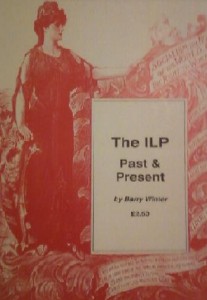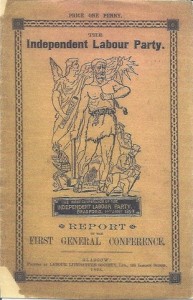This year marks the 130th anniversary of the ILP, a milestone in British political history that we aim to mark and celebrate over the next 12 months in a number of ways, starting with Indie Labour Fest in Bradford this Saturday.
The Independent Labour Party was founded on 13 January 1893 when around 130 delegates gathered at the Labour Institute in Bradford to create a national political party to represent working class people and strive towards a socialist society.
 It has remained in continuous existence ever since, its radical spirit transforming and transformed by different generations of ILPers all seeking to make socialism relevant to their times.
It has remained in continuous existence ever since, its radical spirit transforming and transformed by different generations of ILPers all seeking to make socialism relevant to their times.
The 130th anniversary of that founding conference falls this Friday and we are marking the occasion by re-printing below a short extract from BARRY WINTER’s seminal history of the organisation, The ILP: Past & Present.
Originally published during our centenary year in 1993, the pamphlet has been re-written by Barry in more recent times – and we hope to produce an updated edition during 2023 alongside a number of other new publications.
Ten years ago, we celebrated our 120th anniversary by posting a series of website profiles of significant ILP figures – not just the most famous names, such as Keir Hardie or James Maxton, but some less well-known ILPers who all played their part in building and sustaining an organisation that has now been ‘living for that better day’ for 130 years.
Barry introduced the first profile in 2013 in a piece headed ‘The Gift of an Ethical Politics’ in which he wrote:
“At its best, the ILP … offered a meaningful political home. It also provided an education, an opportunity for people to develop their skills and abilities and, not least, it offered fellowship and fun. Like any human organisation, it could fall short of its promise but something of that ethical approach to politics and life was reborn in each generation.
“In a society that today is wary and cynical about politics and politicians, where people feel they don’t matter, that they don’t count, it is important to keep alive their belief that another way of living is possible.
“Many ILPers may have been more optimistic than was sometimes wise about social change. But their vision and passion not only gave their lives meaning, it became their gift to us.
“It is a gift that we should value and – dare I say – cherish.”
We have continued to publish ILP profiles on our website ever since and you can find them all here.
Here is Barry’s brief account of the ILP’s founding conference.
* * * *
Beginnings in Bradford
“The ILP grew from the bottom up: its birthplaces were those shadowy parts known as the provinces…When the two-party political system began to crack, a third party with a distinctively socialist character emerged…amongst the mills, brickyards and gasworks of the West Riding.”
From: Homage to Tom Maguire by Edward Thompson (copies available here).
It was no coincidence that the ILP’s founding conference was held in Bradford. The city and surrounding textile areas had a strong tradition of radicalism dating back to the early years of the industrial revolution.
 By the late 19th century, Bradford was one of Britain’s foremost industrial cities. Dominating its bleak skyline, as it still does, was Manningham Mills, employing 5,000 low paid, non-unionised workers, most of whom were women.
By the late 19th century, Bradford was one of Britain’s foremost industrial cities. Dominating its bleak skyline, as it still does, was Manningham Mills, employing 5,000 low paid, non-unionised workers, most of whom were women.
After issuing an eight per cent dividend to shareholders, in December 1890, the millionaire mill-owner announced wage cuts of between 15 and 33 per cent. Not surprisingly, emotions ran high among the workforce, many of whom were women, and a strike was called.
The dispute exploded into a major confrontation which sharply divided Bradford opinion. The strikers faced hostility from many Liberals and Tories on the council, from the employers, the courts, the press and the police. Even the military were called upon to disperse one large public meeting in support of the strike.
But the strikers received strong backing and financial support from the local community, particularly from Bradford and Leeds-based socialists, as well as more widely. Between 60,000 and 90,000 people attended one of their mass meetings.
The dispute, which lasted five hard and hungry months, ended in the workers’ defeat. As a result, the strike leaders expressed the need to have their own political party. In 1891, they set up the Bradford Labour Union. A year later this was followed by the Bradford Independent Labour Party.
Similar experiences led to the formation of dozens of local ILPs elsewhere in the country, for example Colne Valley and Halifax in Yorkshire, in Manchester and Nelson in Lancashire, and in Newcastle then in Northumberland.
In January 1893, some 120 delegates met in Bradford to set up the Independent Labour Party as a national party. George Bernard Shaw, the dramatist, attended on behalf of the London-based Fabian Society, but not without some controversy. The ageing Frederick Engels, the close associate of Karl Marx, welcomed the ILP’s formation.
The conference, chaired by Keir Hardie, was conducted in good spirits. After years of campaigning and debate, the ‘Impudent Little Party’, as its critics now described it, had been born.
From: The ILP: Past & Present, by Barry Winter
—-
More details of Saturday’s Indie Labour Fest are here.
You can find the ILP Profiles here.
More on the ILP’s history is here.


